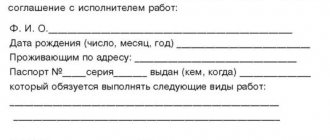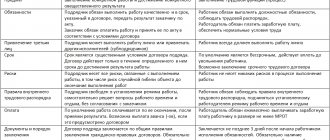What are the types of violations on the part of the employer?
Many employers save money on employees, indirectly or directly infringing on their rights. There are several disorders that are particularly common. If you know them, you can calculate in advance the steps of an unscrupulous leader and protect your interests.
Working and rest conditions
The law establishes (Article 108 of the Labor Code of the Russian Federation) that during a work shift, employees are required to be provided with a lunch break lasting from 30 to 120 minutes. The specific time is determined at the enterprise and indicated in internal documents.
Food must be taken in a specially designated room or directly at the workplace, where there must be a table and chair.
Additionally, people should be given short breaks for short rest. However, this is already regulated by the internal rules of the organization.
In practice, it often turns out that the above requirements are forgotten. Employers do not provide short breaks at all, and also force people to work during lunch without paying any compensation.
Lack of vacation schedule
Employees of enterprises go on regular vacations as scheduled. A violation of the law consists in its absence. In accordance with Art. 123 of the Labor Code of the Russian Federation, the rest period for the next year of personnel is drawn up and approved at the latest in December of the current year. The document must be signed and stamped by the director.
When the schedule is drawn up, the possibility of replacing the vacationer with another employee is taken into account in advance. This allows you to avoid production disruption when workers are sent on vacation.
Not providing vacations
A ban on taking another vacation is a common violation by managers. They tell the subordinate about the heavy workload or the impossibility of replacing him with anyone else during the rest period.
In Art. 115 of the Labor Code of the Russian Federation states that annual paid leave must last at least 28 calendar days. From the date of registration of the employment contract until the right to take leave becomes available, at least six months must pass.
Employers, by not providing time for rest, are directly violating labor laws.
Performing overtime work specified in the contract
Employees are required to perform only those duties that are reflected in their job descriptions. This document is signed on the day of employment.
Sometimes there is a need to work outside of school hours. In Art. 152 of the Labor Code of the Russian Federation specifies the rate of payment for the first 2 hours of work at 1.5 tariffs. Subsequent ones - in double.
For your information! Time off may be provided as compensation.
No time sheet
Shifts are reflected in the corresponding report card, which must be approved, certified, signed and registered. If this document is missing, labor laws are violated.
The accounting department calculates wages based on the time sheet. If it is not there, it is almost impossible to prove the work activity. In addition, in the absence of a document, the employer can engage in various frauds.
Salary
Each person, when applying for a job, takes into account the amount of wages. After receiving the first payments, it often turns out that they do not correspond to the employer’s assurances when signing the contract. Violation of wages is the most common illegal act.
The amount of earnings is indicated in the admission order. Some companies are introducing a system for collecting penalties and fines due to non-compliance with internal rules and regulations. If the employment contract contains this information, the salary will actually be less than the accrued one. The law allows this.
In the absence of such a clause in the agreement, the imposition of penalties is considered unlawful, since it is prohibited to cut salaries without reason.
Salary below minimum wage
In the Labor Code in Art. 133 determines that any work must be paid in an amount not lower than the minimum established at the federal level. Regional authorities may increase the minimum wage.
Managers of organizations are obliged to calculate and pay wages in accordance with the time worked. Its size cannot be lower than the minimum wage.
No advance
In Art. 136 of the Labor Code of the Russian Federation regulates the procedure for paying remuneration for work. It says that salaries should be paid at least 2 times a month. Specific terms and dates for the transfer of funds to employees are assigned by employers at their discretion and are reflected in collective agreements.
Late payment of vacations
Vacation time must be paid in advance. According to the law, the minimum interval between the payment of vacation pay and going on vacation is 3 days.
Important! If this provision of the law is not met, then the vacation can be postponed to the next year.
Often this loophole allows managers to deliberately delay vacation for subordinates by not paying vacation pay on time.
Dismissal
To terminate an employment relationship, a legal basis is required. An employee may wish to resign or transfer to another company. An employer has the right to get rid of a subordinate due to the fact that he is not suitable for his position or systematically violates internal rules.
Violations by management include:
- being forced to submit an application on one’s own initiative - for example, the director requires the employee to leave on his own so as not to apply a bad article to him;
- failure to indicate in the application the reason for leaving the enterprise - the law determines that unjustified dismissal is unlawful, therefore the document is considered legally incorrect;
- failure to comply with the deadline for notification of termination of employment relationships - in Art. 81 of the Labor Code of the Russian Federation states that in case of dismissal at the request of the manager, the subordinate must be notified of this no later than 14 days before the closing date of the agreement;
- delay of due payments upon dismissal and failure to issue a work book - the last working day is the day of final settlement with the employee.
Note! Failure to comply with the law is punishable by penalties (Article 232 of the Labor Code of the Russian Federation).
Violations when making payments to an employee
The most common violation of an employment contract is failure to comply with deadlines for payment of wages (or payment once a month instead of the required two), vacation pay, sick leave, late (incomplete) payment upon dismissal, etc.
Let's figure out what the deadlines are for making payments:
- According to Art. 136 of the Labor Code, wages must be paid to the employee twice a month on the days established by local regulations.
- When dismissing an employee, full payment must be made exactly on the day of dismissal.
- Vacation pay, according to the same article. 136 of the Labor Code and clarifications from the letter of Rostrud dated July 30, 2014 No. 1693-6-1, are paid 3 calendar days before the start of the vacation.
- Upon dismissal, payment must be made on the last day of work (Article 140 of the Labor Code).
What is the employer's liability for violations?
Article 362 of the Labor Code of the Russian Federation establishes that management employees who are guilty of violating the law are required to bear responsibility.
In Art. 21 of the Labor Code of the Russian Federation determines what duties an employer must perform:
- comply with laws;
- provide work in accordance with the employment contract;
- pay accrued earnings;
- guarantee labor safety;
- comply with the instructions of supervisory and control government services.
In Art. 419 of the Labor Code of the Russian Federation provides for different liability, depending on the type of violation.
Disciplinary
Violations of this type include:
- orders and instructions are drawn up in the wrong form;
- holidays are delayed;
- additional payment for overtime work is not paid, etc.
As a punishment, the employer is subject to fines in the amount established by law.
Administrative
This group includes the following types of violations:
- the manager did not inform about the insured event;
- conciliatory negotiations with employees are ignored;
- a person with foreign citizenship was illegally recruited to work, etc.
In accordance with Art. 5.27 of the Code of Administrative Offenses of the Russian Federation, if working conditions are violated, administrative liability is assigned in the amount of:
- 1000 – 5000 rubles - for officials, individual entrepreneurs;
- 30,000 - 50,000 rubles, ban on carrying out activities for up to 3 months - for legal entities.
If a repeated violation is committed, for which punishment has already been applied, the authorized body has the right to disqualify the company for a period of 1–3 years.
Criminal
Due to the fault of the employer, the following situations may occur at the enterprise:
- an employee is injured or killed;
- subordinates were discriminated against;
- Salaries were not paid for more than 3 months.
The above violations are punishable by imprisonment and the opening of a criminal case.
Material
In Art. 232 of the Labor Code of the Russian Federation states that if an employer causes damage to its employee, he is obliged to compensate it. Violations of this type include the following:
- the subordinate suffered moral harm;
- the employee is illegally deprived of the opportunity to work;
- the employee's property was damaged;
- due payments are not transferred within the period established by internal documents, etc.
For material violations, liability is determined in the courts.
Wrongful dismissal
Another violation is the dismissal of citizens without good reason or with other violations of the Labor Code. Dismissal due to violation of the employment contract by the employer can be challenged by employees in court. To do this, the following points can be proven:
- lack of notice of termination of the employment agreement two weeks before the appointed date;
- the manager does not issue the appropriate order;
- there are violations in the entries made in the work book;
- there is no valid reason for dismissal.
Even if an employee has evidence that the head of the company forced him to write a letter of resignation at his own request, the employer will be held administratively liable. Additionally, he will have to compensate for the moral damage caused to the specialist.
https://youtu.be/gXAUMelo9as
Where should an employee go to assert their rights?
If you know the norms of the current labor legislation, then it will not be difficult to defend your interest and prove the fact of violation. To report this, the injured employee should contact the following authorities:
- labor inspection;
- prosecutor's office;
- labor dispute commission;
- trade union body;
- court.
If the application is submitted to the labor inspectorate, the paper must describe the fact of violation of the employment contract and ask for an answer about the result of the inspection and the measures taken. If deficiencies are identified, the responsible inspection specialist orders the employer to eliminate all violations within a specified period.
Upon contacting the prosecutor's office, an investigation is organized. Based on the results, a decision is also made to eliminate the identified offenses.
Recommendation! Filing a lawsuit is the most effective means to protect your rights. Along with the application, proof of work at the enterprise is attached, as well as confirmation of the violation of rights by the employer.
What to do if labor rights are violated
Violation of the obligations undertaken by the manager entails a violation of the worker’s capabilities. To restore violated rights, the employee must contact the competent structures.
The appeal must be submitted to a special commission, which is created in almost every company. This approach will allow you to solve the problem at the initial stage more optimally and quickly. It should be noted that this option is beneficial for both parties.
The next way is to contact regulatory and supervisory authorities, that is, the labor inspectorate or the prosecutor's office. These structures do not resolve issues on the merits, but can make a submission demanding that violations be eliminated. This method is more effective. Although this will complicate relations with the company's management.
In such a situation, the interested person is obliged to send a written appeal, to which he will receive a comprehensive response, attaching a request to eliminate the deficiencies, if any.
Another, perhaps the most common, method is to go to court. This can also be done by submitting a written request, accompanied by available documentary data.
Filing a complaint
A person can complain, including to the commission, as well as to supervisory and control authorities.
The procedure is identical in all cases. First of all, the interested person needs to make a written appeal. For these purposes, he can resort to the services of a specialist or draw up the paper himself. It should be noted that in this case there is no need to attach a large list of supporting documentation to the application. A copy of the concluded working agreement will be sufficient.
In the text of the appeal you must indicate:
- the name of the authority that will consider the application;
- information about the initiator - full last name, first name, patronymic, place of work, position held, place of actual residence;
- date and essence of the violation on the part of the manager;
- what terms of the agreement were violated;
- list of attached documentary data;
- date of preparation of the paper, personal signature of the compiler.
We suggest you read: Employee computer rental agreement
The application, along with all documentation, is sent by mail or delivered in person.
In the case of a commission, the appeal will be considered within ten calendar days from the date of submission by the initiator. The discussion will take place in the presence of the worker or at the latter’s written request without him, with the participation of at least half of the members of the specified group.
If a person contacts the inspectorate, he will receive a response to his appeal within thirty days. Sometimes a worker may appeal to the specified authority on an issue the consideration of which is not within its competence. In this case, the initiator’s appeal will be sent to the competent structure within seven days, of which the initiator will be notified.
The same procedure is provided for cases of appeal to supervisory authorities, that is, to the prosecutor's office.
Going to court
According to the general rules, any employee can go to court for restoration of violated rights. An appeal to this authority can occur on any fact of violation by the manager of the terms of the agreement, since each of them can cause damage of a different nature to a person.
The current general provisions determine the time period for sending a petition to the court. It is three months. The specified period begins to be calculated from the moment when the worker learned or could learn about the violation of his capabilities.
There are two exceptions here:
- In case of disagreement with dismissal from his position, the worker may go to court within one actual month from the date of resignation.
- If the question concerns debt on mandatory payments, then such a period is one year from the date of expiration of the transfer period.
The petition itself must be in writing. Its content is similar to the content of an appeal to supervisory and control authorities.
It should be noted that a more extensive list of supporting documentation may be required here. Since a person may not always have all the required information on hand, the forensic specialist considering the appeal can request it himself. But this will slightly increase the processing time of the application.
Criminal
This type of liability is applied in situations where truly serious violations are identified, so employees have to face negative consequences. This includes not making a salary payment for three or more months. At the same time, there is evidence that these funds were used by the employer for personal gain.
https://youtu.be/CQgPfP8IYSc
Additionally, criminal liability is imposed if the head of the enterprise knowingly provides workers with equipment that is dangerous for use. To impose a punishment, a trial must be held, since this requires a court decision. Based on the available evidence, the guilt of the director of the enterprise is revealed.
Violation of vacation deadlines
As mentioned above, some employers have a nominal vacation schedule - for verification purposes only. And employees go on vacation whenever the employer pleases.
Summer is the time for vacations, and bosses, on the contrary, try not to let their employees go on vacation at this time. Let them walk in winter! This is not true! When drawing up a vacation schedule, you need to take into account not only the opinion of the workers themselves, but also their interchangeability. Then every employee will be satisfied with both work and rest.
It is possible not to allow an employee to go on vacation according to the schedule only if there are compelling reasons, which are all spelled out in Chapter 19 of the Labor Code of the Russian Federation. But each of these grounds must be formalized from the point of view of personnel production. The vacation schedule must be drawn up before December 15 of the current year for the next calendar year. That is, vacations for 2020 must be scheduled before December 15, 2017. The schedule is approved personally by the management of the enterprise and certified by the main seal.
Violation of labor protection requirements
The most dangerous violations of the terms of an employment contract by an employer for the health of employees are those related to the obligation to comply with labor safety standards in the workplace. In this case, violations can be very diverse.
The most common cases are when the employer does not comply with Art. 209–212 Labor Code requirements for certification of employees’ places of work. If this procedure is ignored, factors threatening the health of the workforce may not be identified in a timely manner, and preventive measures may not be taken to bring conditions into compliance with state standards.
It is also common for employers to ignore the requirement to ensure regular mandatory medical examinations provided for in Art. 213 Labor Code for employees working in difficult conditions or related to transport work. It is equally important that workers who are employed in the catering system, the food industry, ensuring the supply of drinking water, and children's and health care institutions undergo regular medical examinations.









